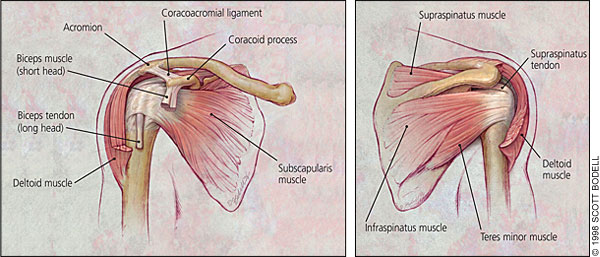Shoulder impingement syndrome is one of the most common problems associated with shoulder pain. Symptoms of shoulder impingement include pain, weakness, decreased motion and even trouble sleeping due to pain. As bad as the pain may seem, unfortunately shoulder impingement can result in rotator cuff tears over time. The good news is that conservative treatment including physical therapy is usually sufficient to restore normal motion and function of the shoulder if treated in time. Understanding how the shoulder works is the beginning of taking control over your shoulder pain.
Causes Of Shoulder Impingement
In a perfect world the four muscles of the rotator cuff, the subscapularis, the supraspinatus, the infraspinatus and the teres minor work in harmony to allow the arm to raise over your head without the tendons becoming pinched between the roof the of acromion and the humerus (upper arm bone). Any condition that narrows this space can cause impingement. Some of the causes are normal variations in the anatomy of the bony structures, weakness of the rotator cuff, instability of the shoulder, and loss of motion of the capsule as in adhesive capsulitis or frozen shoulder.
The History Of A Rotator Cuff Tear
Shoulder impingement is classified into 3 stages. Stage I is usually associated with an overuse injury. Conservative treatment is usually sufficient, and may include sport or work modifications and rest from the aggravating activity. Stages II and III occur with more chronic shoulder impingement, which can lead to progressive damage of the tendons and eventually leading to a tear.
An ounce of prevention is worth a pound of cure. Conservative treatment including rest, ice packs, non-steroidal anti-inflammatory drugs and physical therapy is usually sufficient to restore normal function. Some patients benefit from steroid injection although there are risks of tendon weakening. Some require surgery, but even the presence of a tear doesn’t necessarily indicate a need for surgery. In fact, some research studies have shown that there is a high incidence of people without symptoms who have evidence of full or partial rotator cuff on MRI. Taking care of your shoulder during early signs of shoulder impingement can help you get back to the activities you love and help prevent lasting problems. If you have pain in your shoulder and have further questions, contact one of our shoulder specialists at 888-713-2220.
